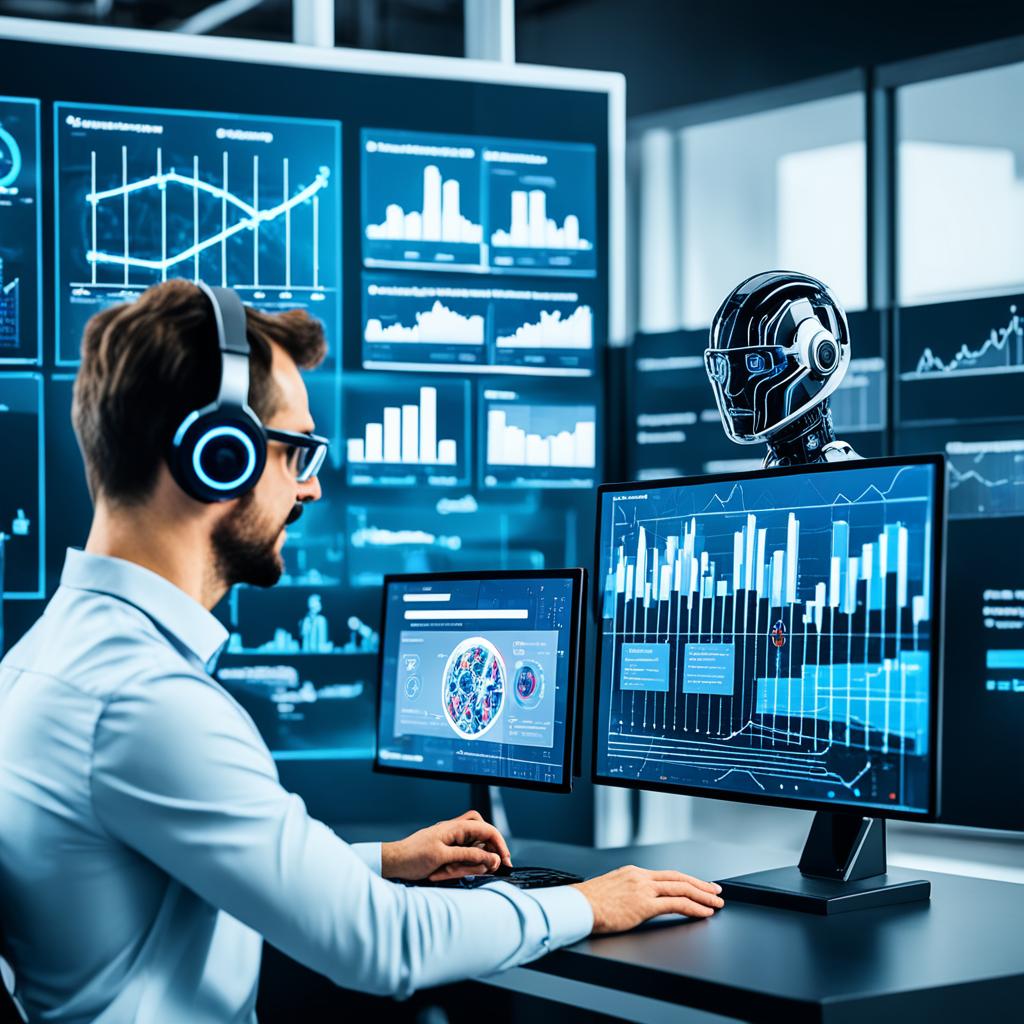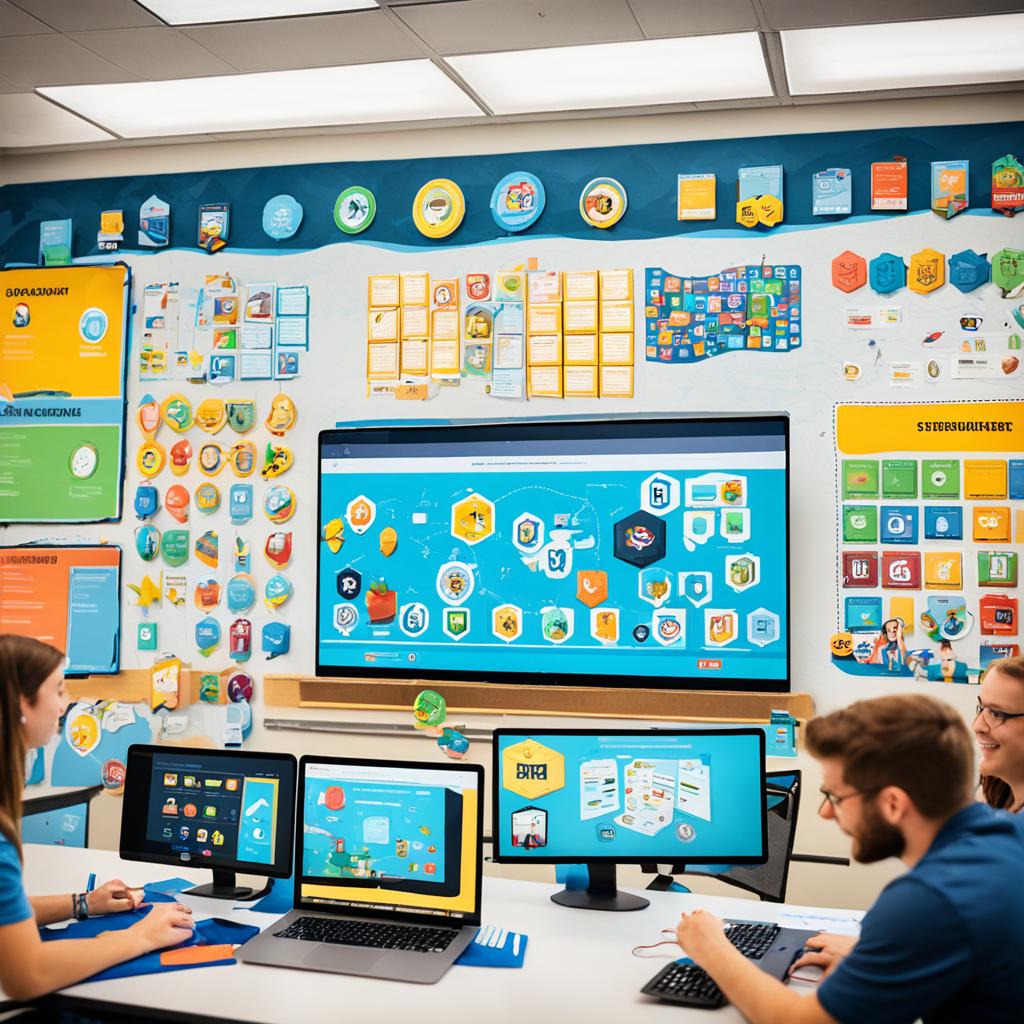Did you know that a third of professionals fear that automation will put their jobs at risk? A artificial intelligence is significantly transforming the work environment, bringing changes to both tasks and collaboration between professionals. This technology is revolutionizing business around the world and offering new opportunities and challenges for professionals in different areas.
Main points covered in this article:
- The role of Chief AI Officer at the Workplace
- New professions driven by Artificial intelligence
- O impact of AI at job replacement
- The potential of gamification at education
- O role of the teacher at gamification from the education
- O future of Artificial Intelligence at the Workplace
The Role of the Chief AI Officer in the Workplace
The Chief Artificial Intelligence Officer is a strategic role created to help organizations understand, leverage and lead the transformation enabled by artificial intelligence. This professional is responsible for implementing AI in a strategic and safe way, leading a team of developers and engineers.
With the increasing adoption of AI, companies have the opportunity to create new roles and dedicate resources to harness the power of generative AI. These professionals will be fundamental in boosting companies’ productivity and keeping up with technological developments.

| Roles of the Chief AI Officer | Responsibilities |
|---|---|
| Implement AI strategically | Lead a team of developers and engineers |
| Identify AI application opportunities | Ensuring the safety and ethical use of AI |
| Leverage the power of generative AI | Monitor technological developments in the area |
Furthermore, the Chief AI Officer plays a crucial role in the cultural transformation of companies by educating and empowering team members about the potential and best practices of AI. He also works closely with other leaders and departments to align AI strategy with organizational goals.
“AI is changing the way we work and live, and it is essential to have leaders dedicated to driving this transformation in our organizations.” – [Name of AI expert]
In short, the Chief AI Officer is responsible for leading the strategic implementation and adoption of artificial intelligence in companies, driving productivity, leveraging the potential of generative AI and ensuring an efficient and successful transformation.
New Professions Driven by Artificial Intelligence
Artificial intelligence is creating new job opportunities and generating demand for specialized professionals. The advancement of AI is driving the creation of roles that did not exist before, requiring specific skills and advanced knowledge.
Machine Learning Engineers
An example of a new profession driven by artificial intelligence is machine learning engineers. These professionals are responsible for developing and training machine learning systems, which are capable of learning and improving on their own from the data provided. They apply advanced algorithms and techniques to create predictive models and solve complex problems.
Conversational Designers
Another profession on the rise is conversational designers. With the growth of AI, there is a demand for professionals capable of adapting AI interfaces to serve the public. These designers are responsible for creating natural dialogues and conversation flows, making interaction between humans and machines more intuitive and efficient.
See too:
AI Ethics Experts
As artificial intelligence becomes increasingly present in our daily lives, there is a need for professionals specialized in AI ethics. These experts analyze and ensure ethics in machine programming, preventing the development of biased or harmful algorithms. They have a responsibility to ensure that AI is used in a fair, transparent and inclusive way.
AI Prompt Designers
With the advancement of AI, AI prompt designers are becoming an increasingly relevant profession. They are responsible for creating questions and instructions that help in the interaction between humans and machines. Its objective is to develop intuitive and friendly interfaces, facilitating use and maximizing the potential of AI.
These new professions show how artificial intelligence is impacting the job market and opening new opportunities for professionals. It is important that professionals are prepared to face the future of work, acquiring specific skills and adapting to the transformations brought about by AI.
| Profession | Description |
|---|---|
| Machine Learning Engineer | Develop and train machine learning systems. |
| Conversational Designer | Adapt AI interfaces to serve the public. |
| AI Ethics Specialist | They analyze and guarantee ethics in machine programming. |
| AI Prompt Designer | They create questions and instructions for interaction between humans and machines. |
The table above summarizes some of the new professions driven by artificial intelligence. These professionals play fundamental roles in the implementation and development of AI, ensuring its use in an ethical, efficient and safe manner.

The Impact of AI on Job Replacement
Automation and increased data processing enabled by AI can lead to job replacement in some areas. Professions such as translation, content writing, telemarketing and technical support are susceptible to being replaced by AI-powered tools such as machine translation programs and intelligent chatbots. Renowned companies, such as IBM and BT, have already announced plans to replace some employees with these tools.
However, the impact of AI at job replacement It's not entirely negative. The implementation of AI also generates opportunities and creates new job vacancies in areas such as Data Engineering and Data Science. As automation takes over routine activities, professionals have the opportunity to focus on more complex and strategic tasks that require unique human skills.
The trend is for companies to increasingly value human skills, such as creativity, problem solving and interpersonal relationships. These skills are difficult for AI systems to replicate and are essential for jobs that involve empathy, creativity and interaction with other human beings. Therefore, even as jobs are replaced, new opportunities will arise for those who develop unique and adaptable skills.
Opportunities and Challenges
AI brings both opportunities and challenges to the job market. While some jobs may be replaced, new positions will be created to meet the growing demands of technology. The key to facing this challenge lies in the training and adaptation of professionals.
“Those who are able to update their skills and adapt to the new demands of the job market will have a greater chance of standing out and securing future job opportunities.” – João Silva, AI specialist
Furthermore, it is important that governments and companies adopt policies and measures to ensure a fair and inclusive transition in the age of AI. Professional requalification, training programs and investment in education are essential to ensure that everyone can benefit from the advancement of technology.
Comparison between Job Replacement and Job Creation
The table below compares the areas where AI could lead to job replacement with the areas where new opportunities and job creation are emerging:
| Job Replacement Areas | Job Creation Areas |
|---|---|
|
|
The table presents an overview of the areas that may be affected by job replacement due to AI, as well as the areas that may offer new opportunities and demand specialized professionals.
As we can see, although some jobs are at risk of being replaced by AI, there is also significant job growth in AI-related fields such as data engineering and data science.
The future of the job market will depend on the ability of professionals to adapt their skills and prepare to face the challenges and take advantage of the opportunities provided by AI.
The Potential of Gamification in Education
A gamification in education is transforming the way students learn, making tasks and learning more fun and exciting. By adding game elements, such as challenges, prizes and medals, to regular activities, gamification engages students and increases their performance.
Studies show that students who use gamified learning platforms perform better compared to those who only receive lectures. Gamification also promotes healthy competition and offers immediate feedback to students, encouraging progress and continuous improvement.

“Gamification in education is a powerful strategy for involving students in the learning process. Through challenges and rewards, we can motivate them to dedicate themselves and excel, creating a stimulating and fun environment.” – Maria Silva, Mathematics Teacher.
Gamification in education not only makes learning more engaging but also develops important skills in students such as problem solving, teamwork and critical thinking. By transforming content into an interactive and personalized experience, gamification promotes a more effective and meaningful learning environment.
Advantages of Gamification in Education:
- Engagement: Gamification actively involves students and increases interest in the content.
- Stimulus: Challenges and rewards encourage students to dedicate themselves and strive to achieve better results.
- Interactive Learning: Gamification provides a practical and interactive learning experience.
- Better Information Retention: Through gamification, students find it easier to assimilate and retain the information learned.
“Gamification in education allows students to have an autonomous approach, exploring concepts and developing skills in a playful and motivating way.” – João Santos, Education Manager.
The Role of the Teacher in the Gamification of Education
The teacher plays a fundamental role in the design and implementation of gamified activities in education. From designing activities to evaluating results, the teacher acts as a guide, offering support and monitoring student engagement. Additionally, the teacher collects data on student performance, evaluates results, and provides constructive feedback.
Gamification in education allows teachers to create a more engaging and motivating learning experience, promoting better educational results in the classroom.
Benefits of the Teacher's Role in the Gamification of Education:
- Guide students in carrying out gamified activities;
- Offer support and encourage student involvement;
- Collect and analyze student performance data;
- Evaluate the results of gamification;
- Provide constructive feedback;
- Promote student motivation and engagement;
- Develop a fun and stimulating learning environment.
“Gamification in education allows teachers to create a more engaging and stimulating learning experience.” – Professor João Silva
Through gamification, teachers can explore strategies such as points, rankings, challenges and rewards to encourage active participation from students. This approach makes learning more fun, sparks student interest and encourages collaboration between them. Furthermore, gamification provides an opportunity to personalize the teaching process, allowing each student to develop at their own pace and be challenged according to their abilities.
With gamification, teachers can transform the classroom into a dynamic and interactive environment, where students feel motivated to learn and seek knowledge autonomously.
| Advantages of Gamification in Education | Results |
|---|---|
| Greater student engagement | Better content absorption |
| Encouraging active participation | Development of socio-emotional skills |
| Promoting creativity and problem solving | Greater knowledge retention |
The Future of Artificial Intelligence in the Workplace
O future of artificial intelligence at the workplace is promising. The changes brought about by AI are driving the creation of new professions and job opportunities. Creative professionals, with the ability to adapt and specialized in innovations, will be increasingly valued. However, it is important to ensure that the implementation of AI is done ethically and responsibly, avoiding prejudice and inequalities. The job market will continue to evolve, and AI will be a powerful tool to leverage human knowledge and promote company growth.
| Benefits of AI in the Workplace | Challenges of the Future Working with AI |
|---|---|
| Automation of repetitive and monotonous tasks | Replacement of jobs in some areas |
| Optimizing productivity and efficiency | Need for professional retraining |
| Capacity to process large volumes of data | Ethical challenges and responsibility in implementing AI |
| Potential to drive innovation and business growth | Concerns about bias and inequalities in AI |
As artificial intelligence becomes more advanced and integrated into the workplace, professionals will need to adapt and develop skills complementary to the technology. The ability to work together with AI and harness its potential will be a differentiator for professionals in a range of areas, from medicine to engineering.
The implementation of AI must be done ethically, ensuring transparency in the decisions made by algorithms and avoiding the perpetuation of prejudices. Responsibility in the use of AI is fundamental to promoting an equitable and inclusive work environment.
In the future, AI will continue to evolve and play an increasingly important role in the corporate world. With the development of technologies such as generative AI and machine learning, the potential for transformation in the workplace is immense. It is up to companies and professionals to take advantage of these opportunities and work together to maximize the benefits of artificial intelligence.
Conclusion
Artificial intelligence is changing the workplace significantly, bringing challenges and opportunities. Automation and data processing are responsible for replacing some jobs, but they also generate new professions and open the way for collaboration between humans and machines.
Gamification in education is also transforming the way students learn, making the process more engaging and stimulating. By adding gaming elements to regular activities, gamification engages students and increases their performance. Studies show that using gamified learning platforms results in better educational results.
O future of artificial intelligence will be marked by the need for adaptation and the value of human skills. Creative professionals, with the ability to adapt and specialized in innovations, will be increasingly valued. It is critical to ensure that the implementation of AI is done ethically, responsibly and inclusively, so that everyone can benefit from this technology and promote a more efficient workplace and education.
FAQ
How is artificial intelligence impacting the workplace?
What are the new professions driven by artificial intelligence?
Is artificial intelligence replacing jobs?
How is gamification impacting education?
What is the role of the teacher in the gamification of education?
What is the future of artificial intelligence in the workplace?
Source Links
- https://tiinside.com.br/06/10/2023/mudancas-e-oportunidades-como-a-inteligencia-artificial-esta-impactando-o-mercado-de-trabalho/
- https://forbes.com.br/carreira/2023/06/chief-ai-officer-chatgpt-como-ceo-e-mais-como-a-ia-esta-mudando-o-trabalho/
- https://pt.linkedin.com/pulse/mudanças-e-oportunidades-como-inteligência-artificial-está-impactando



